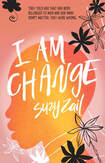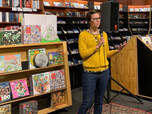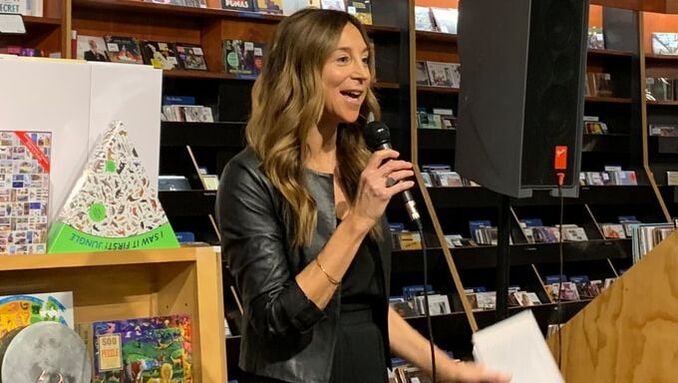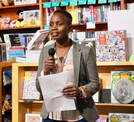- Home
- About
- Inkflower
-
Books & Writing
- Inkflower
- Arabella's Alphabet Adventure
- I am Change
- The Wrong Boy
- Alexander Altmann A10567
- The Tattooed Flower
- Playing for the Commandant
- Hanna Mendels Chans
- La Pianista di Auschwitz
- Der Klang Der Hoffnung
- De Gave Van Hanna Mendel
- Saving Midnight
- Was Dir Bleibt, Ist Dein Traum
- Il Bambino Di Auschwitz
- Smitten
- All You Need is Love
- Pianista De La Auschwitz
- Other Writing
- Author Talks
- Contact
- News
|
I wish I could've invited everyone to the Launch of 'I Am Change'! It was such a great night. Sarah Ireland, the CEO of OneGirl kicked the night off with a moving speech about the power of educating girls, then after I spoke, Olivia Bamwine, a Ugandan friend of mine, talked about her own experiences growing up as a girl in a male-dominated society where she was taught to stay silent and serve men.
Here's an excerpt of my speech if you're curious about why I wrote the book and what I've learned through the process. It’s been four years since I went to Uganda, three and a half years since I tapped the first words of ‘I Am Change’ onto my keyboard and saw the beginnings of a story fill the screen. I remember how badly I wanted to capture the sticky African heat, the dusty streets and the wide smiles of the girls whose stories I promised to tell. And how huge a task it seemed to trap everything I’d learned in that complicated, beautiful place in the pages of a novel, a novel I hoped might illuminate what it means to be a girl in a place where girls are invisible. Writers are often told 'Write what you know.' In writing holocaust fiction, I’d clung to that rule, drawing on my father’s childhood story to write my first two Young Adult novels. The 2014 abduction of more than 200 Nigerian schoolgirls by Boko Haram, a terrorist organisation opposed to girls’ education, changed that. The kidnapping haunted me. I wondered what I could do. Not just for the hundreds of terrified school girls, but for the millions of girls around the globe who were being denied an education. And then, by chance, I met Nakamya Lilian, a 29-year-old Ugandan girl visiting Australia. As soon as she told me her story about growing up in a small impoverished village, desperate for an education, I knew the heart of my next book. But Lilian’s story was only one story, one voice. I needed to learn more, so I flew to Uganda. I was a girl who grew up surrounded by books, a girl encouraged to learn. A girl who'd never felt the sting of a slap, or the hollowness of an empty stomach. I didn't know what it felt like to be a poor African girl without shoes or schoolbooks. I needed to speak to girls who did. The best way to do that, I decided, was to contact aid organisations who fought to keep girls in school. I settled on five organisations based in Kampala who advocated for girls’ rights and emailed each of them explaining that I hoped to write a novel about a Ugandan girl struggling to stay in school, but to write an authentic story I needed to meet the girls who lived that story. I met thirty girls through organisations like Concern for the Girl-Child and Girls Not Brides. I went to their villages, visited their huts, walked to the wells where they gathered water and visited the schools where they learned to speak English until, one by one, they dropped out. They told me about forgoing meals to pay for textbooks and trading their bodies for school fees. They told me about the lessons their aunts taught them about their bodies and about men. All of them wanted, more than anything, to learn. I started my days at 8 am, with a line of girls waiting to share their stories. I knew the power of my novel would ride on detail, and so I asked lots of questions. What were the walls of your hut made of? Could you see the stars through the thatched roof? How do you lift a jerry can full of water onto your head? I had an hour with each girl, so I had to get straight to the darkest parts of their story. I asked questions you’re not supposed to ask a stranger: When you got your period, what do you use to soak up the blood? How did you feel when your husband took another wife? How often did he beat you? I mined their most private and intimate moments and they forgave my ignorance and shared their heartbreak with such warmth and generosity. At first, my tendency was to ask sensitive questions, to tread carefully and sympathise… until I realized that wasn’t actually what they needed. They wanted me to listen, so I grew quiet and listened. I learned to become comfortable with silence, and leave space for them to fill in, leave space for their pain. Most days I returned to my hotel after dark, too overwrought with sorrow and anger to sleep, but alongside the anger also sat admiration and awe. None of the girls I interviewed had both their parents. Many were orphans, their mothers dying of diseases the witch-doctors couldn’t cure and their fathers abandoning them for second and third wives. They lived without running water or electricity. Of the 30 girls I talked to, only 6 were in high school, all of them on scholarships. They lived in concrete boxes in the city’s slums, walking an hour to school on an empty stomach. They did their homework on their laps by the light of the moon and they considered themselves blessed. They were lucky to be learning, they told me. “If you can read and write you can get a good job and you won’t be hungry.” Every bit of knowledge they could wring from their teachers was a step away from the slums. I’d often ask the girls ‘what makes you smile?’ There was so many sad stories, I wanted to know what brought them joy. Books, they told me, and their faces lit up. I didn’t eat lunch the seven days I was there. It felt wrong to pull my sandwich from my bag, when they only ate one meal a day and wouldn’t share mine. I knew this book I had planned to write wasn’t enough to make up for all they’d lost, but, as an author, story was the best way I knew to inspire action, to make people care. Because that’s what books do - especially sad ones - they force us to imagine another person’s pain; to understand, rather than judge, to connect as humans. I left Uganda, with their secrets and dreams in my notebook. I knew hearing their stories was a privilege and that, with that privilege, came a deep and profound responsibility to get the details right, so when I returned to Australia, I continued my research, devouring memoirs and history books, reaching out to professors in Uganda, tribal leaders, teachers and aid workers. It was confronting learning about forced marriages, sexual assault, female genital cutting, domestic violence and the everyday struggles of so many young girls. I almost didn’t write. I almost couldn't. But then, on the page, in the middle of the heartbreak, were small moments of happiness; young girls smiling and stamping their feet to the beat of a drum, starlight, fire light, cousins and clan. And a girl I’d called Lilian drawing letters in the dirt, determined to learn. I was writing during troubling times and that propelled me too. When you’re writing, you’re trying to find answers to things you don’t understand. I didn’t understand how a man who had so little respect for women was elected to run one of the most powerful countries in the world or why women’s rights were being stripped back, and racism was on the rise. All that confusion, anger and fear found a home in Lilian, a girl who wouldn’t be tamed. A girl who spoke out and rebelled in ways I never did. I’d grown up always doing as I was told, doing what was expected. And so, I wrote a book about a girl finding the strength to fight for change, a girl who was afraid, but used her fear to fuel her success. I threw obstacles at her to see if she would make it. I made her stand up and demand what was hers. I wasn’t a particularly assertive or confident teenager, back then we didn’t have the language or framework to tackle inequality, we didn’t have Me too or Michelle Obama and so when my driving instructor made comments about my legs, or the father I babysat for flirted with me, I bristled but did nothing, said nothing. Writing this book for teens about female empowerment, empowered my own teenage self. As a teen I’d never thought of myself as a feminist. I didn’t know who I was or what I stood for and it seemed like such a big statement, so much more than what it is - someone who wants to shape their own life and believes they matter equally. I wanted Lilian to matter equally. I wanted her to find her voice. I didn’t realise in the process I would find mine. I wrote for three years, sending each draft to Namukasa Nusula Sarah, a student I had interviewed on my first day in Kampala. I needed to know I had gotten everything right - how they gripped the cassava when pulling it from the ground, the songs they sang around the fire, the things their aunties taught them so they would be good wives. Namukasa translated words into Luganda and taught me songs. She shared the fables she’d learned as a child and the games she’d played at recess. She sent photos of pit latrines and cooking huts. Yes, she confirmed, teachers sleep with students or yes, my friend who was 13 was married just like that, or yes, the girl in chapter 6 would have spread her legs for a few coins. And then- it was done. It was bittersweet typing those last 2 words - the end. There was pride and relief but also sadness. I’d grown close to my characters, even the ones I’d meant to despise, and then, like children, I had to let them go and send them into the world to be judged, along with my writing. Waiting for first reviews is nerve wrecking, but not nearly as nerve-wrecking as waiting for Namukasa’s verdict on the final draft. I’d sent it to her after making the changes she suggested, and I remember the relief I felt after reading that she had been watching for mistakes but after a few pages had become lost in the story, in her story, and she’d cried, because she was Lilian. She wrote to me: Me and my friends and the girls in my village, everything that happened to Lilian and her friends has happened to one, or all, of us. It’s all there. The lessons and the beatings, the laughter, the drums, the hunger and the fear. I Am Change is a sad story but it’s also a story of hope. The girls I met in Uganda are poor but they are fierce and determined. They don’t need our pity. They will shape their own future, if given the tools. As Namukasa says in her beautiful forward to the book: 'Things can change. Me and my friends will make them change. We just need some help.' I guess, that’s what tonight is about. Change. I wrote this book to offer an alternative vision and add another voice to those who’ve been stifled. The aim in all my books is to reveal to readers worlds they don’t know. With this book it was to have readers look up from the page and be stirred not just to feel something but to do something. You’ll find a phone number on the flyer inside my books where you can donate to Help Girls Learn Uganda, an initiative I set up on my return from Kampala. Money raised will go to the 5 incredible organisations I work with, who save girls from unwanted pregnancies and marriages to older men, feed them when they’re hungry and sit them at desks. We might not have the power to change the world, but we can change one person’s world and bit by bit change entrenched ways of thinking. Things are starting to change in Uganda’s capital. Girls are finishing school and women can choose their own husbands. The change will reach the smaller villages if we continue to make noise and nurture institutions that protect and empower girls so that all girls believe they are worthy of an education; that their bodies are their own and their minds matter.
4 Comments
|
Proudly powered by Weebly




